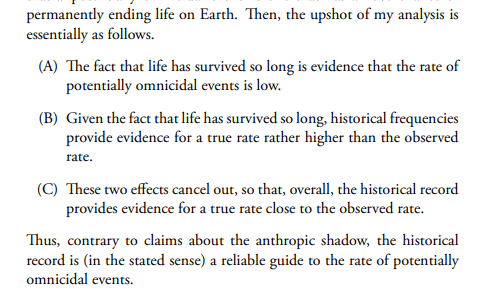This is a linkpost for Dispelling the Anthropic Shadow by Teruji Thomas.
Abstract:
There are some possible events that we could not possibly discover in our past. We could not discover an omnicidal catastrophe, an event so destructive that it permanently wiped out life on Earth. Had such a catastrophe occurred, we wouldn’t be here to find out. This space of unobservable histories has been called the anthropic shadow. Several authors claim that the anthropic shadow leads to an ‘observation selection bias’, analogous to survivorship bias, when we use the historical record to estimate catastrophic risks. I argue against this claim.
Upon a first read, I found this paper pretty persuasive; I'm at >80% that I'll later agree with it entirely, i.e. I'd agree that "the anthropic shadow effect" is not a real thing and earlier arguments in favor of it being a real thing were fatally flawed. This was a significant update for me on the issue.
Anthropic shadow effects are one of the topics discussed loosely in social settings among EAs (and in general open-minded nerdy people), often in a way that assumes the validity of the concept[1]. To the extent that the concept turns out to be completely not a thing — and for conceptual rather than empirical reasons — I'd find that an interesting sociological/cultural fact.


I thought about it more, and I am now convinced that the paper is right (at least in the specific example I proposed).
The thing I didn't get at first is that given a certain prior over P(extinction), and a number of iterations survived, there are "more surviving worlds" where the actual P(extinction) is low relative to your initial prior, and that this is exactly accounted for by the Bayes factor.
I also wrote a script that simulates the example I proposed, and am convinced that the naive Bayes approach does in fact give the best strategy in Jack's case too (I haven't proved that there isn't a counterexample, but was convinced by fiddling with the parameters around the boundary of cases where always-option-1 dominates vs always-option-2).
Thanks, this has actually updated me a lot :)